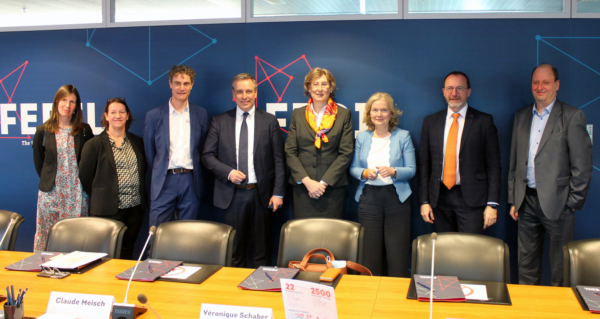 (L-R) Nadine Thill, Chamber of Commerce; Judith Gledhill, ABBL; Thierry Wolter, FEDIL; Claude Meisch, Minister of National Education, Children and Youth; Véronique Schaber, MEN; Isabelle Schlesser, ADEM; Georges Engel, Minister of Labor, Employment and th;
Credit: FEDIL
(L-R) Nadine Thill, Chamber of Commerce; Judith Gledhill, ABBL; Thierry Wolter, FEDIL; Claude Meisch, Minister of National Education, Children and Youth; Véronique Schaber, MEN; Isabelle Schlesser, ADEM; Georges Engel, Minister of Labor, Employment and th;
Credit: FEDIL
On Tuesday 8 March 2022, the FEDIL - The Voice of Luxembourg's Industry and the Luxembourg Bankers’ Association (ABBL) published the results of the eleventh edition of their survey "The qualifications of tomorrow in the field of ICT" relating to the hiring forecasts of companies in the field of information and communication technologies (ICT).
The survey report was presented in a press conference in the presence of Luxembourg's Minister of National Education, Children and Youth, Claude Meisch, Minister of Labour, Employment and of the Social and Solidarity Economy, Georges Engel, as well as survey partners.
The survey represents to date the only indicator existing in Luxembourg on the need for qualifications in the sector covered and constitutes a unique economic barometer, even if it concerns recruitment forecasts and not definitive promises of employment commitment from participating companies.
In view of the challenge that recruitment represents today for many companies, the promotion and search for young talent continue to be a priority subject for the FEDIL and ABBL associations.
Targeted orientation is therefore of strategic importance: it helps to influence the chances of candidates on the job market, while guaranteeing companies a pool of qualified talents.
The survey, intended for young people, their parents and those responsible for guidance, aims to meet several objectives, namely to identify the needs of companies, to reconcile supply and demand for training in the interest of young people, to give a reliable indicator to educational and vocational guidance services as well as adapting training policy to economic realities. This is to ensure that initial vocational training enables young people to acquire the qualifications sought in the future.
Since its launch in 2002, the survey has thus contributed to the creation of new training courses in the field of ICT on a national scale.
The health crisis linked to COVID-19 has accelerated digital transformation and fostered the need for a qualified workforce in the field of ICT. Like previous editions, the 2022 survey shows a very significant hiring potential in the next two years with a total of 687 hires for 97 companies, including 47% to replace departures and 53% to occupy new posts created.
The number of hires per participating company (7.1) is up sharply compared to 2020 (5.8).
Nevertheless, it is clear that the rate of creation of new positions (53%) is down compared to 2020 (69%) while the rate of replacement of departures (47%) is the highest since the launch of the survey in 2002.
The survey therefore confirms that with a proportion of ICT specialists already above the European average, the Luxembourg economy remains largely a creator of jobs, especially at a high level of qualification, with requirements increasingly directed towards high levels of training. The "BAC+2" level is a minimum required in 95.9% of cases and university degrees are the most sought after with 89.8% of forecasts. Among the latter, the most advanced university degrees at Master's or Doctorate level are much more sought after (60.4%) than Bachelor's degrees (29.4%).








